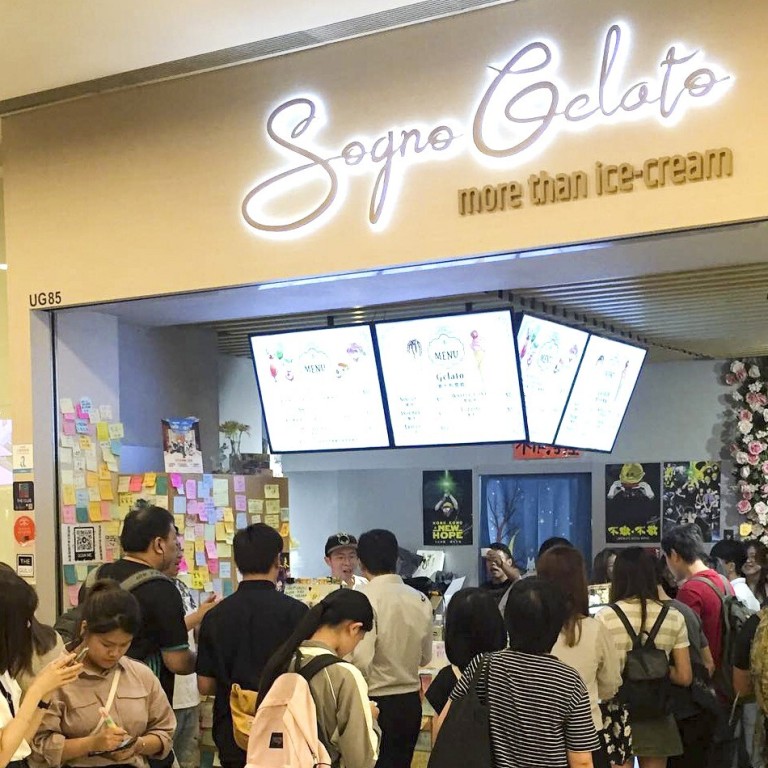
Discord in Hong Kong’s ‘yellow economic circle’ as staff disputes, mistrust add to Covid-19 business woes
- Struggling yellow shops find a lifeline offering takeaway services, discounts for bulk orders
- Disagreements, accusations lead prominent restaurant chain owner to quit yellow movement
Gelato maker Chung Yiu-wa landed a bumper order worth HK$111,786 (about US$14,400) in the run-up to the Mid-Autumn Festival.
The single sale of 678 cups of his Italian-style dessert, 118 ice cream cones and 280 gelato mooncakes was delivered to a group of 250 Tseung Kwan O residents, who joined forces to make the online order.
The firms openly declare their backing for protesters, campaigning actively online for Hongkongers to shop there and shun “blue” establishments branded pro-government, pro-police or pro-Beijing.
The yellow shops, mostly small enterprises, were hit hard when Covid-19 arrived in January and customers stopped coming because of social-distancing measures put in place to curb the spread of the coronavirus.
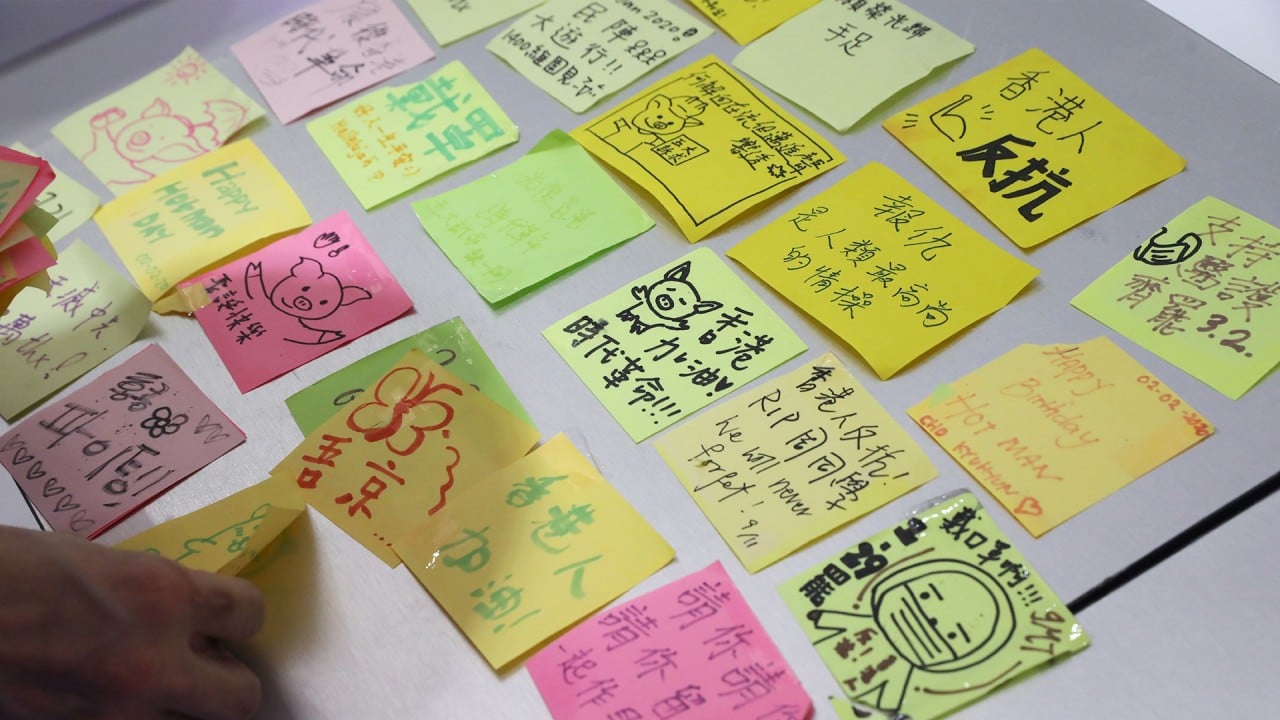
03:40
Hong Kong security law prompts ‘yellow’ cafe to clear opposition Post-it notes from Lennon wall
Sogno Gelato was among about 1,000 yellow establishments to declare on Facebook since February that they were facing an emergency and at risk of going under, appealing to supporters to save their struggling businesses.
But yellow food establishments found a lifeline by promoting takeaway services and offering discounts for bulk orders.
“The shop was earning only a few hundred dollars a day. Without takeaways and bulk orders, we would have collapsed long ago,” said Chung, 32.
Big orders from community groups, like the Tseung Kwan O residents who bought his gelato, have become a way for people to continue supporting yellow outlets despite social-distancing measures and rules restricting the number of dine-in patrons.
Victor Wu, 34, was also busy making and delivering mooncakes for the Mid-Autumn Festival this year.
In June, he and about 10 others who met at the protests started a lava custard mooncake enterprise named I Really Love Hong Kong, selling their products through 76 yellow eateries across the city.
The mooncakes are not cheap, at HK$238 a box of four, but Wu said: “When you buy our mooncakes, you’re also buying our ideals.”
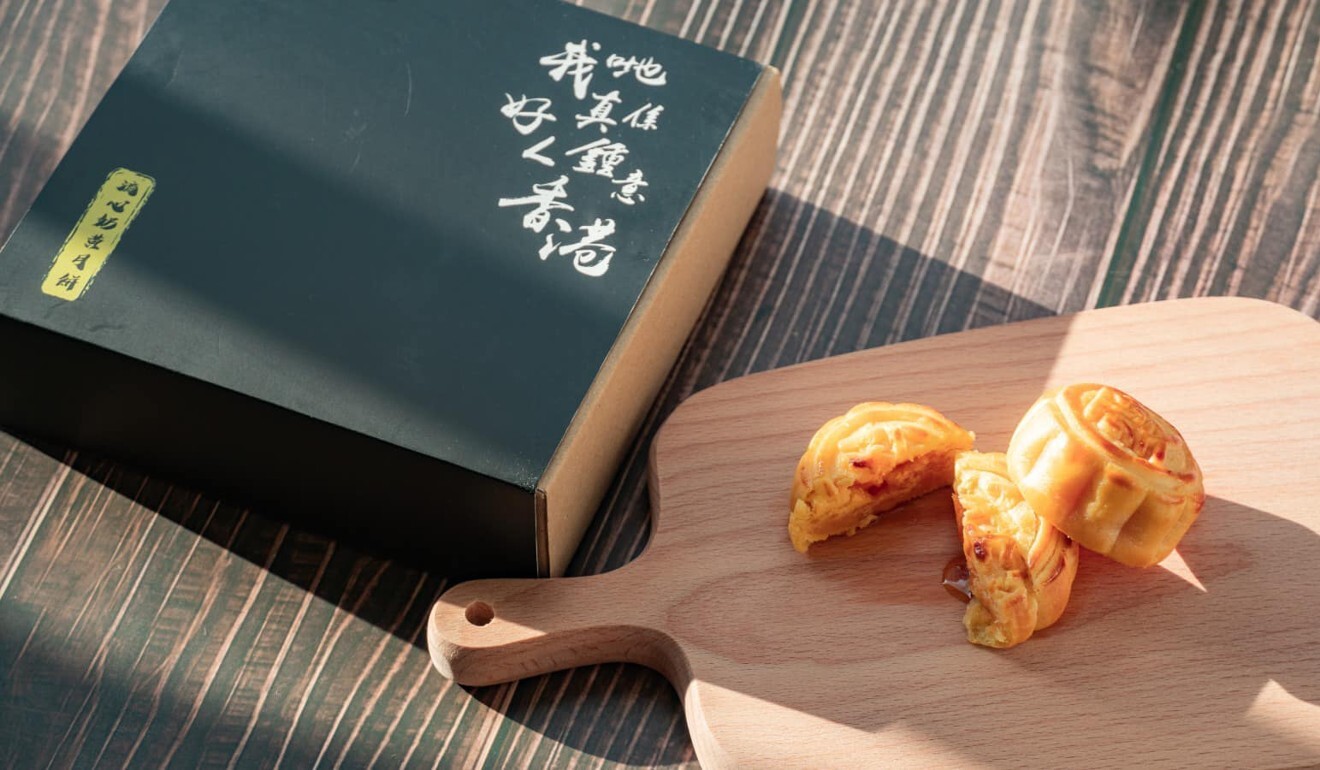
He said 20 per cent of the revenue goes to the retailer, and 15 per cent goes to protest funds such as Spark Alliance and the 612 Humanitarian Relief Fund.
He has so far been encouraged by the feedback at the sales outlets.
“Some people buy five or six boxes, and I am delighted by that,” he said. “When I hear that people love our mooncakes – on Facebook, Instagram or YouTube – I am very grateful.”
Social media has helped spread the word about the young company – which has a strong presence on Facebook and Instagram – and some opposition politicians and activists have been promoting their products online to tens of thousands of followers.
Wu remains clear about his motivation for pressing on despite the pandemic challenges: “I don’t want people who love lava custard mooncakes to spend at blue shops.”
Divided we dine: perils of a ‘blue’ vs ‘yellow’ Hong Kong economy
‘Not everyone is good’
Unlike last year, when owners of yellow shops were upbeat about their prospects, this year has seen them grappling with staff problems and cracks in their solidarity.
Some small business owners have accused bigger players in the yellow circle of not doing enough to help those struggling to survive.
Chung opened Sogno Gelato nearly two years ago in a Tsuen Wan shopping centre, and was one of the first in the city to declare his shop a yellow business last year.
The tiny shop is packed with protest merchandise, including postcards to send to jailed protesters, and items featuring protest mascots Pepe the Frog and LIHKG Pig. Proceeds go to funds supporting protesters who were arrested.
Disappointing start to ‘golden week’ for Hong Kong retailers
Chung employed about 15 protesters in their teens and 20s, referred to in the movement as “children”, as most faced strained family relationships because of their political views.
If any were arrested during protests, he would get a lawyer to help them.
But not all his “children” have lived up to expectations. Some have been sloppy at work. Once, someone left the refrigerator door open overnight and all the gelato melted. Another time, someone forgot the dry ice and did not tell him.
Worst of all, four stole from him. Although the thefts left him feeling betrayed, Chung refused to report anyone to the police and continued giving food coupons even to those he had to sack.
“Not everyone in the yellow circle is good, I admit that,” he said.
Over in Sai Ying Pun, professional basket baller Chow Kin-wan’s Korean-style cafe, JMT Coffee, has been struggling, and the strain took a toll on his staff.
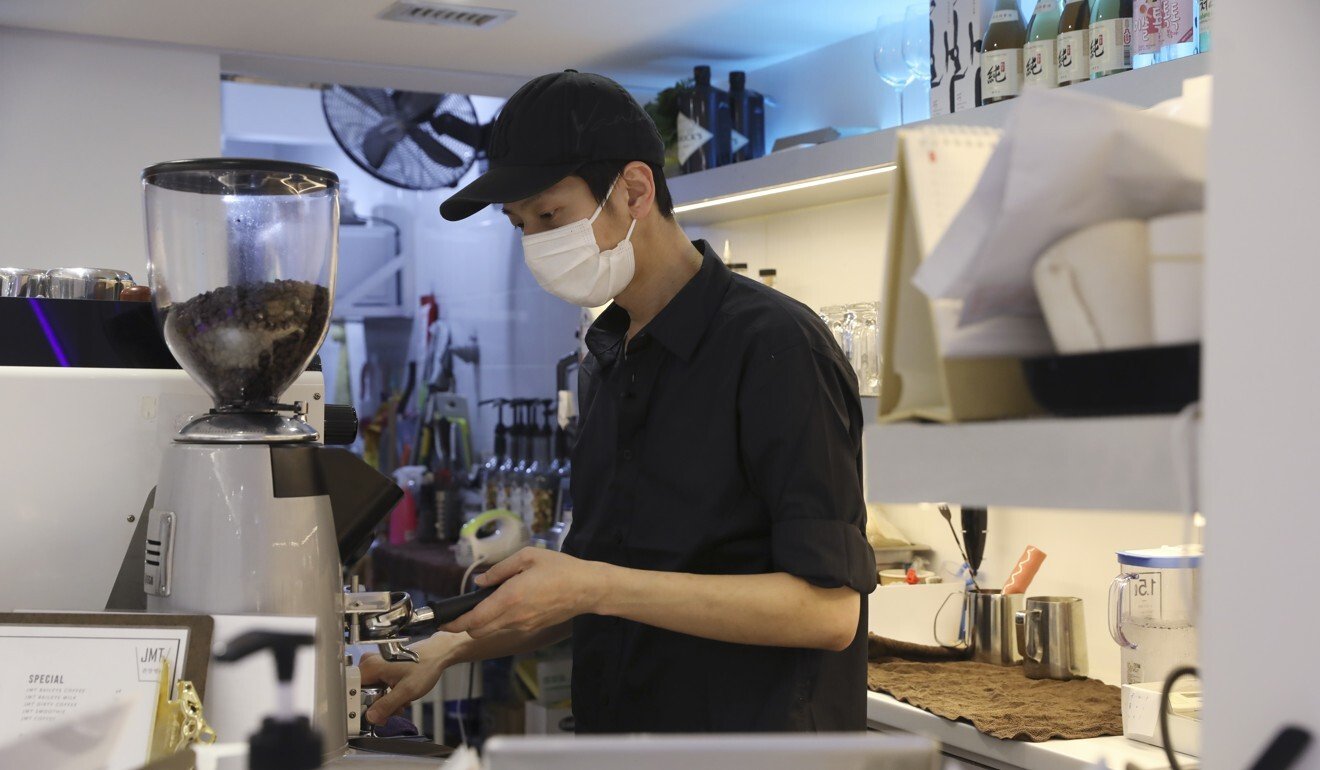
With patrons thinning to a trickle, the cafe’s takings were badly affected and three employees quit, complaining about low pay.
His staff have berated him, saying he would rather donate to protest funds than pay them more. He said they do not realise he has to cover the rent, electricity bill and stocks for the shop.
“They only think about their salaries,” the 30-year-old said. “Do I feel demoralised? Definitely, but we will persevere.”
The problems at Sogno Gelato and JMT Coffee were mild compared with what happened at Agape Garden, a yellow restaurant in Ngau Tau Kok.
In August, a waitress complained to Worker Com, a protest-friendly Facebook labour rights group, that she was not given a payment due to her under labour laws when she was sacked.
The restaurant claimed initially that she resigned and was therefore not entitled to the payment. Worker Com later published a phone recording of a restaurant manager confirming that she had, indeed, been fired on the spot.
Hong Kong adds 10 new Covid-19 cases, clamps down on rule-breaking bars, eateries
The dispute attracted hundreds of comments on Facebook and LIHKG, the online forum popular with protesters, mostly slamming Agape Garden for failing to admit that it fired the waitress.
Two weeks later, the restaurant made the shock announcement that it was closing down after three years and all 130 employees would lose their jobs.
In a Facebook post, it said poor handling of the labour dispute led to the battering it received on social media and its decision to close.
One man who played a prominent role in promoting yellow businesses last year but has now quit the economic circle is Cheung Chun-kit, owner of the Lung Mun Cafe chain of restaurants.
He not only welcomed protesters at his eateries last year, but also sank a considerable amount of money into starting a vocational training centre for protesters to pick up skills and improve their prospects of finding a job.

He was upset earlier this year when he was accused on LIHKG of pocketing donations meant for the centre, a charge he vehemently denied.
Cheung posted his accounts online as proof that the allegations were untrue, but Marco Yeung Long, a former administrator at the centre, renewed accusations against Cheung in the media.
On June 30, Cheung announced on Facebook that he was pulling his restaurants from the yellow circle. In August, he sent Yeung a lawyer’s letter, suing him for defamation over remarks about his restaurant chain and attitude.
Despite the disputes and controversy, Gordon Lam Sui-wa, convenor of the Hong Kong Small and Middle Restaurant Federation, said the problems were not serious, and the situation at individual businesses did not represent the entire yellow circle.
He said the social phenomenon still remained, allowing consumers to consider political ideology when deciding which shops to patronise.
“I can’t think of a reason for the circle to suddenly collapse,” he added.
Raising Hong Kong minimum wage inappropriate, business leader says
National security law jitters
The controversial law, tailor-made for Hong Kong, reflected Beijing’s impatience with the city’s failure to bring last year’s unrest under control. It bans in broad terms acts of secession, subversion, terrorism and collusion with external forces.
Aside from backing the protest movement openly, many yellow businesses also showcased their political stance in their shops.
Their premises were adorned with protest materials, including “Lennon Walls” featuring numerous colourful sticky notes bearing pro-protest messages and popular slogans from last year’s unrest.
Worried that these might run afoul of the new law, many businesses cleaned up their premises.
For nearly a year, JMT Coffee’s walls were plastered with hundreds of lime green, yellow and neon pink notes on which customers had written slogans and words of encouragement for comrades-in-arms in the protests.
“Five demands, not one less,” said the message on one note. Another said: “Hong Kong independence”.
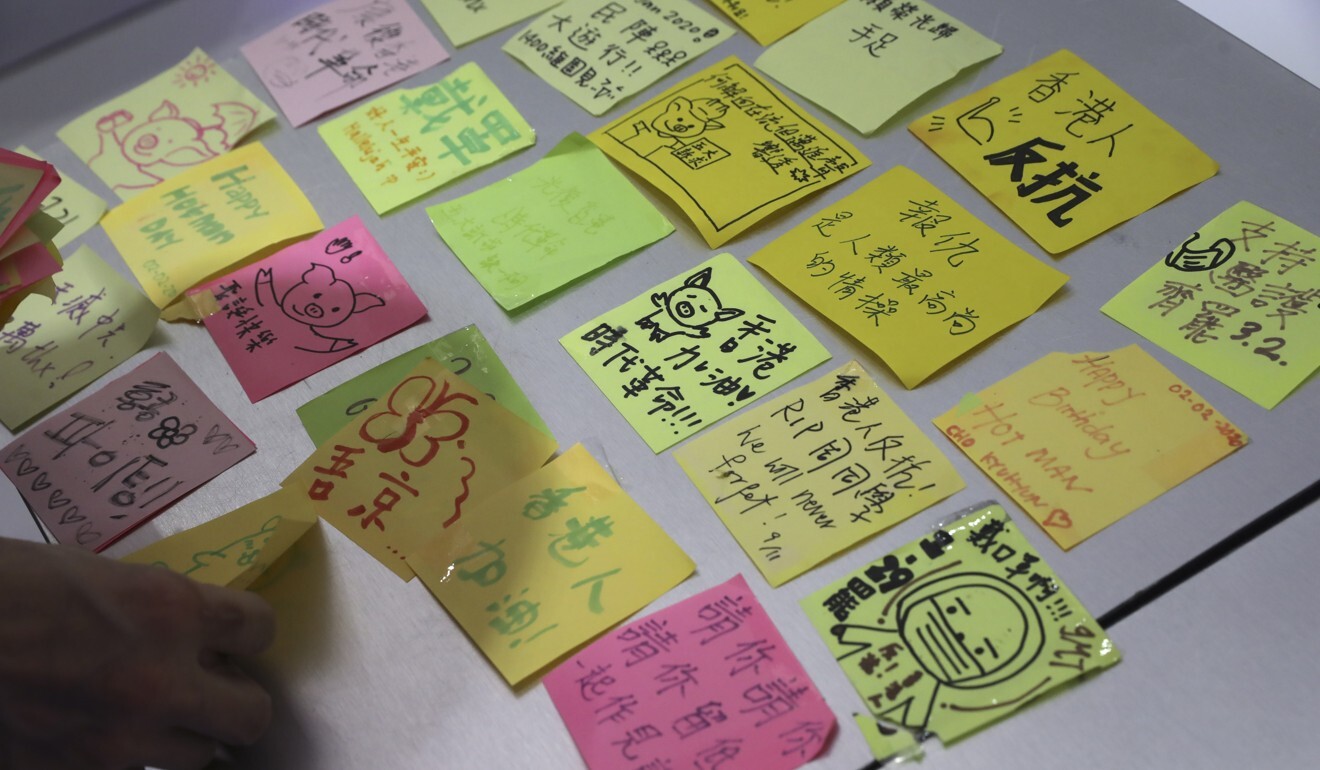
Chow, who removed all the notes, said: “When you look at them again, the emotions are still there, the melancholy is still there. I was heavy-hearted. Why did it turn out this way?”
But it was better to be safe than sorry.
He is now staying focused on keeping his cafe going, relying on the support of friends like actress Lee Yee-man, who has risked her career by actively promoting yellow businesses.
She was a guest “manager of the day” at the cafe recently, and although her presence did not improve the crowd significantly, she was a good sport and stayed late.
“I am helping out because they asked, and we have similar ideals. It’s about helping each other,” she said.
Chow said his coffee shop will carry on, with the aim of helping to build a society where power comes from the people.
“I hope to use food to connect with people I want to send a message to,” he said. “Catering is just a small, personal way of changing society.”

